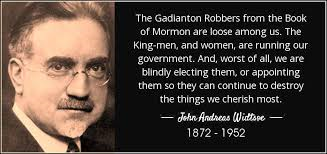It interests me that the first thing Amulek did when he came forward to speak was to recite his own ancestry. He said:
- I am Amulek
- Son of Giddonah
- Son of Ishmael
- Descendant of Aminadi (who interpreter the writing which was upon the wall of the temple, written by the finger of God
- Descendant of Nephi
- Son of Lehi
- Descendent of Manasseh
- Son of Joseph sold into Egypt. (See Alma 10: 2-3)
Many ancient cultures introduced themselves by reciting their lineage. Tribes in Africa, Arab tribes, ancient Chinese, Indian and others practice this means of cultural identity. For Amulek to have done so was in harmony with many ancient cultures around the world. Even today in some traditional Native American groups, heritage is a way of introduction. For example, among the Navajos, if one is meeting another Navajo who is a stranger to you, one would cite his born-to clan (his mother's) and his born-for clan (his father's).
After the recitation of his genealogy, Amulek also brings out that he is well known in the area, that he has many kinfolk and friends, and that he has been financially successful.
He may have chosen to do so just because it was an expectation in his Nephite culture, or he may have chosen to do so because of the way the group had responded to Alma when he first arrived. The people were antagonistic from the beginning. They said to Alma:
Who are thou? Suppose ye that we shall believe the testimony of one man. . . ? We will not believe they words. . . And . . . Who is God, that sendeth no more authority than one man among this people. . . ? (See Alma 9: 2, 4, 6)
The irony is that they knew perfectly well who he was, because on his first visit they said to him: Behold, we know that thou art Alma; and we know that thou art high priest over the church . . . we are not of thy church and we do not believe in such foolish traditions. . . . Thou hast no power over us . . . Thou hast delivered up the judgment seat to Nephihah; therefore thou art not the chief judge over us. (See Alma 8: 11 - 12)
Because they knew who he was, I think when they asked him "who art thou?" on his second visit, what they were really saying, in the modern vernacular, "Who do you think you are, coming here to pronounce judgment on us? Our Law of Witnesses demands that, even in a court of law, there must be two or more witnesses brought forth to establish a case. Where is that second witness?"
Amulek was that second witness. He made a point of stating his lineage as one who had the right to speak and reminding him that he was a well-known and well-respected man in the community, giving his words credibility.
That the people still did not listen was a point against them on their road to destruction. Oh, that all people could study the Book of Mormon. Problems that seem only political are also spiritual. And problems that seem primarily only spiritual are also often political. The war between good and evil seems to envelope both.
© June 2020 Dr. Kathleen Rawlings
Buntin Danielson


































